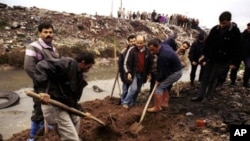There is a political storm raging in Turkey over the release of the leaders of a radical islamic Kurdish group from prison. Called Hizbullah, the group is blamed for the torture and killing more than 100 people in its battle with the Kurdish separatist organization the PKK.
When the leading members of Hizbullah were sprung from jail in early January, their release caused shock around Turkey.
"They killed so many people, seen as sympathetic of PKK, especially lawyers, teachers, some civil societies people," said journalist Rusen Cakir, an expert on the group. "And in the beginning of 2000 security forces discovered so many people killed by people by Hizbullah after having being tortured by Hizbullah. So it maybe most terrifying political organization of Turkish republic."
Hizbullah, unrelated to the Lebanese Hezbollah, is believed by many to be responsible for the deaths of hundreds of people during the mid-1990s, the worst years of the conflict between the outlawed Kurdistan Workers’ Party, or PKK, and Turkish government forces. Hizbullah came to prominence in the late 1980s in southeastern Turkey. Some experts say its aim is to destroy the secular order and spread “true Islam” throughout the country, by force if necessary. However, strong claims have surfaced over the years that it was the state itself that established the organization to fight the PKK through illegal means, such as summary executions.
Rusen Cakir believe the state did use Hizbullah for this purpose:
"Public enemy of number one for the state was PKK," said Cakir. "So sure that Hizbullah by fighting PKK were encouraged, supporters or sponsored by different status apparatus."
But when Hizbullah starting targeting government officials, Turkish security forces killed its leader and arrested the remaining Hizbullah leadership.
In the wake of the arrests, Hizbullah began moving away from violence and set up numerous organizations providing charity for the Kurdish poor. At the same time, members began advocating its radical Islamic agenda.
The group now is believed to be one of the most powerful organizations in the predominately Kurdish southeast.
In early January, Hizbullah leaders were leased from jail allegedly due to a law limiting the arrest period for unconvicted people. Their release comes as the government suffered several electoral defeats in the predominately Kurdish southeast to a resurgent Kurdish nationalist movement. Leader of the main opposition Kemal Kilicdaroglu says that is no coincidence:
"Your MPs, in Batman and Van, did they go to the offices of Hizbullah Society or not? Why is the prime minister not calling Hizbullah a terrorist organization? Could it be because of their partnership in the Southeast?" said Kilicdaroglu.
But Turkish Prime Minister Recep Tayyip Erdogan dismisses those accusations.
"To connect AKP with Hizbullah or any other terror organization is tactlessness and cowardice," he said. "Where is the evidence?
Such denials are not expected to silence the deepening controversy, especially with a general election expected this June.
Analysts say the predominantly Kurdish southeast is a key area for the ruling AK party in the June election. But with a rejuvenated Kurdish nationalist opposition, they may have a uphill battle.
Cakir says the release of the Hizbullah leadership is a major moral boost to the organization. And, if Hizbullah decides to enter the elections in the key predominantly Kurdish southeast, its powerful grass roots movement could be key to determining the Turkish prime minister's votes there.












